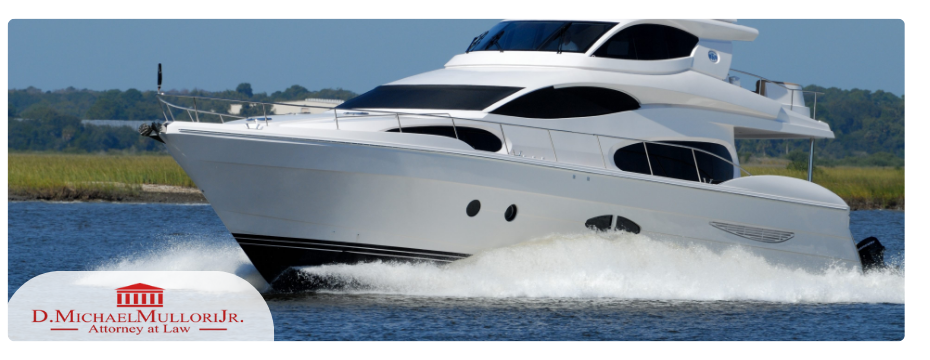Boating Accident Lawyer in Virginia

Over 250,000 motorboats are registered in Virginia, 30,000 of which are personal watercraft, according to the Department of Wildlife Resources. When the weather warms, more boaters go out on the water, and more boats operating, unfortunately, means an increase in boating accidents.
Accidents can range from boat collisions to dock accidents and have several causes:
- Operator error
- Boating under the influence of alcohol or drugs
- Distracted boating
- Boating equipment defects
- Reckless boating
- Inexperienced boaters
- Bad weather
- Insufficient or confusing signage
If you have sustained injuries in a boating accident in Virginia due to someone else’s negligence, get legal help from D. Michael Mullori, Jr., Attorney at Law. We are prepared to pursue your case aggressively and use every available legal avenue to seek justice for your losses.
Contact us today or call (703) 762-2142 to discuss your case with a boating accident attorney in Virginia. Our office is conveniently located at 2500 Hunter Place, Suite 102, Woodbridge, VA.
What Are the First Things to Do After a Boating Accident?
After a boat accident in Virginia, it is critical to act quickly to preserve evidence and protect your claim to compensation.
Here are some steps you should take after an accident on the water:
- Notify authorities about the accident and request emergency assistance if required.
- Seek treatment for your injuries ASAP and get copies of all relevant documentation.
- Obtain the other involved operator’s information, including contact details, insurance coverage info, and boat registration.
- Take photos and videos of your injuries and the accident scene.
- Keep invoices and bills related to accident expenses.
- Contact Virginia boating accident attorney Mike Mullori to initiate the claims process.
The Department of Wildlife Resources also requires involved parties to submit a formal boating accident report in accidents involving injury, death, disappearance, or more than $2,000 in property damage.
Boating Laws in Virginia
Virginia has several laws regulating commercial and private recreational boating in the state’s waters. The laws structure and regulate boating activity, and violating them can expose the offender to legal liability for injuries they cause.
Most boating safety laws are contained in Article 3 of Title 29.1, Chapter 7 of the Code of Virginia.
Below are some of the most important rules that all boaters should know:
- Boater education requirements – Every operator of a motorboat with a horsepower of 10 or greater must carry proof of completing boating safety education training provided by the Virginia Department of Wildlife and Recreation.
- Reckless boating operation – Boaters are prohibited from operating their vehicles in a reckless manner or manner that endangers the lives of health or other people. Specific behaviors the law mentions as reckless include weaving, following too closely, jumping wakes, and crossing between tow boats and individuals using water skis and other devices.
- Boating DUI laws – It is illegal to operate a motorized watercraft with a blood-alcohol concentration of 0.08 percent or higher or under the influence of any drugs that impair their ability to operate a watercraft safely.
- Speed limits – Virginia doesn’t have general boating speed limits, but the law requires operators to operate at low speeds in designated no-wake zones or within 50 feet of any docks, piers, and boathouse.
- Lifejacket laws – Every boat in Virginia must carry at least one Coast Guard-approved lifejacket per person. Every passenger under 13 must wear a lifejacket while the boat is underway. These laws help prevent drowning fatalities from boating accidents.
- Safety equipment – All boats must carry a fire extinguisher, navigation lights, and appropriate ventilation systems. All boats must also have a muffler that reduces noise to a reasonable degree.
Potential Compensation for Boating Accident Injuries
Boating accident victims have the right to seek financial compensation from the negligent parties who caused them harm.
Depending on your situation, you may be able to recover fair compensation for accident-related losses, such as:
- Medical bills and continuing medical expenses for injuries sustained in the boating accident
- Long-term care for permanent disabilities
- Lost wages from missing work
- Differences in pre- and post-injury earning capacity
- Pain and suffering
- Mental anguish
- Loss of life enjoyment or convenience
- Property repair or replacement
In order to secure compensation, you must show that the at-fault party demonstrated negligence in operating their watercraft. For instance, if the operator was impaired by alcohol and caused the accident, they could be judged as negligent and liable because they violated Virginia’s boating laws and caused injuries.
Our attorney can rely on several types of evidence to prove liability in your boating accident case, including:
- Photographs and video recordings
- Physical evidence
- Accident reports
- Witness statements
- Medical documentation of injuries
- Boat owner’s maintenance logs
- Boat operator license records
- Analysis and accident reconstruction
What Are the Leading Causes of Death in Boating Accidents?
Virginia has one of the highest boating fatality rates in the nation, and Virginia’s boating accidents cost nearly $4 million per year. According to information from the U.S. Coast Guard, three out of every four boating deaths are due to drowning.
Nearly 90 percent of drowning victims were not wearing a lifejacket or life preserver. Most of these deaths occur when a person falls from a boat after a collision or the boat capsizes and throws passengers into the water.
The two leading contributing factors to boating fatalities are boat operator inexperience and alcohol use, both of which can serve as evidence of negligence in boating accident lawsuits.
How Our Virginia Boating Injury Lawyers Can Help
One major difficulty with boating accidents is that they can involve a separate set of maritime laws that distinguish them from car crashes and other accidents on dry land. Boat accidents may also involve commercial entities, such as when a commercial barge collides with a personal watercraft or someone sustains injuries on a tour boat.
These challenges highlight the importance of working with an experienced attorney who is knowledgeable about Virginia’s boat-specific legislation and insurance practices.
D. Michael Mullori, Jr., Attorney at Law, has over 25 years of experience working with injury victims in Virginia and knows how to effectively pursue your boating accident claim. Our firm is deeply familiar with Virginia’s numerous boating rules and required safety measures and can use them to your benefit. Most importantly, we emphasize constant communication so you are always in the loop about your case.
Call our office at (703) 762-2142 or contact us online today for a free consultation with a boat accident lawyer in Virginia. We charge an attorney fee only if we win your case. Don’t try to handle your case alone. Get the legal help you need from our personal injury attorney today.
Call for a free consultation



